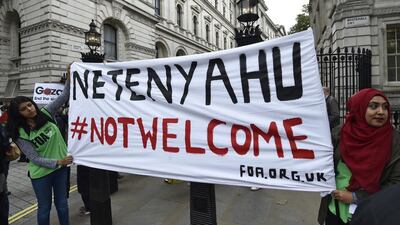The UK is cracking down on local authorities who take part in the movement to boycott, divest from and sanction Israel (BDS), saying that it violates global trade laws. This follows an international lobbying effort by the Israeli government to encourage foreign powers to rein in anti-Israel campaigners. It is the second success for the Israel lobby against BDS campaigners this week, after US president Barack Obama signed a law that included language recognising trade between illegal Israeli settlements and the United States.
The BDS movement has been dubbed by Israel an existential threat to the state, and is even considered by some politicians as a “new intifada”. The economic impact, however, is disputed. One Israeli government report warned that BDS would cost the state $1.4 billion (Dh5.1bn) each year, roughly 0.5 per cent of the country’s GDP. Other analysts believe that the economic effect is smaller. Few Israeli firms will, for example, mourn the decision by Leicester City Council to stop buying products from Israel, they point out.
Instead, the argument has more symbolic motives on both sides. Israel wishes to delegitimise the BDS movement, and therefore protect its control over the narrative of the conflict with the Palestinians. For Israel, the conflict is about what it says is an issue over security and not about rights. For BDS campaigners, the issue is a moral one, with the focus on the deprivation of Palestinians rights and the nature of the occupation.
The Israeli-Palestinian conflict is based on narratives. It is nearly impossible for BDS campaigners to significantly derail Israel’s economy, but the conversation that they raise by targetting the likes of Leicester City Council alters the complexion of the mainstream debate about Israel’s behaviour. Therefore, the conflict is fought in small increments that, taken as a whole, may ultimately turn the tide. The 40-year battle to boycott apartheid South Africa is a good example of how long these campaigns can take.
The British government argues that local government support for BDS undermines international trade agreements. This is not an unreasonable interpretation because governments are often bound to protect their economic interests above political concerns. However, the battle is not about trade: it’s about how criticism of Israel can be expressed. Israel wants to persuade foreign governments to make it harder for its critics to have a voice. But the argument will not be settled that easily.

